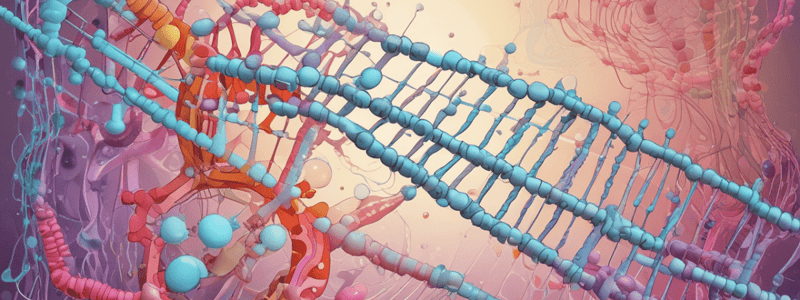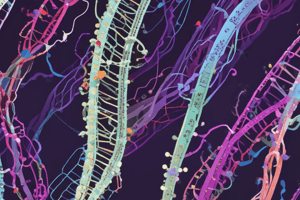Podcast
Questions and Answers
What is the primary function of a restriction enzyme in molecular biology?
What is the primary function of a restriction enzyme in molecular biology?
- To synthesize new DNA strands
- To amplify DNA fragments through polymerization
- To recognize and cut DNA molecules at specific recognition sequences (correct)
- To separate DNA molecules based on their size
What is the purpose of DNA ligase in the process of gene cloning?
What is the purpose of DNA ligase in the process of gene cloning?
- To cut DNA molecules at specific recognition sequences
- To amplify DNA fragments through polymerization
- To seal gaps in the phosphate backbone of DNA molecules (correct)
- To separate DNA molecules based on their size
What is the characteristic of a restriction site that is often palindromic?
What is the characteristic of a restriction site that is often palindromic?
- It is only a few nucleotides long
- It reads the same forward and backward (correct)
- It is always 8 bp long
- It is only found in prokaryotic organisms
What is the purpose of gel electrophoresis in molecular biology?
What is the purpose of gel electrophoresis in molecular biology?
What is the definition of gene cloning or recombinant DNA technology?
What is the definition of gene cloning or recombinant DNA technology?
Flashcards are hidden until you start studying
Study Notes
Analysis of DNA - at the Gene Level
Polymerase Chain Reaction (PCR)
- PCR is a sensitive technique that can amplify a specific segment of DNA from a minute amount of template DNA.
- It requires two specific primers that bind specifically to a known sequence on the template DNA.
- The PCR cycle consists of three steps: denaturation, renaturation (annealing), and DNA synthesis.
- The cycle is repeated for 25-35 cycles, resulting in an exponential increase in the amount of target DNA (2n, where n is the number of cycles).
- PCR is limited to amplifying segments of DNA up to 1000 bp.
DNA Sequencing
- DNA sequencing is the ultimate analytical assay for determining the individual nucleotides that make up a DNA molecule.
- The Sanger dideoxy chain termination method was established in 1975.
- DNA molecules are separated in a gel and migrate due to the presence of an electric charge.
- DNA fragments are separated according to size, with smaller fragments migrating quickly and larger fragments migrating more slowly.
- The separated DNA can be visualized under UV light by staining with ethidium bromide.
Gel Electrophoresis
- Gel electrophoresis is a technique that separates macromolecules (proteins/DNA/RNA) on the basis of their size or charge.
- DNA molecules are negatively charged and move towards the positively charged electrode when placed in an electric field.
- DNA fragments can be separated according to size, with smaller fragments migrating quickly and larger fragments migrating more slowly.
Southern Blotting / Hybridisation
- Southern blotting is a technique where DNA separated by electrophoresis is transferred to a membrane filter and detected by the binding of a labelled probe.
- The technique is used to detect variations in large DNA fragments.
- The steps involved in Southern blotting are: DNA molecule cutting with RE, separation of DNA fragments on a gel, denaturation of DNA into single strands, transfer of DNA to a membrane filter, and hybridization with a labelled probe.
- Hybridization involves adding a labelled probe that binds to specific complementary DNA sequences on the membrane.
Restriction Analysis / Gene Cloning
- Restriction enzymes recognize and cut specific sequences of DNA (restriction sites) to create single-stranded ends.
- The single-stranded tails are "sticky" and can form hydrogen bonds with complementary sticky tails on other DNA molecules cut with the same enzyme.
- The gaps between the fragments are closed by DNA ligase, creating a single recombinant DNA molecule.
- Restriction enzymes are crucial tools in many molecular biological techniques, such as gene cloning.
- Gene cloning involves introducing a foreign DNA fragment into an organism to create a population of organisms with the same gene or genes.
- There are over 600 commercially available restriction enzymes.
Studying That Suits You
Use AI to generate personalized quizzes and flashcards to suit your learning preferences.




